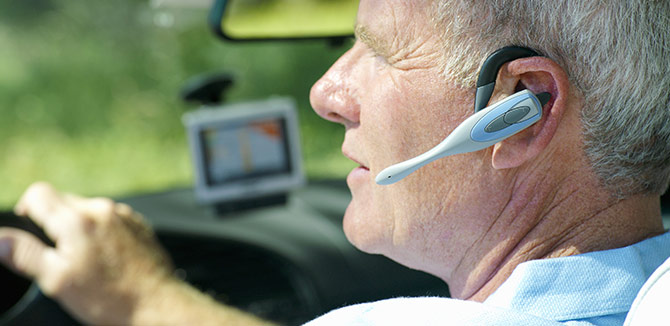Why Hands-Free Phones Still Lead to Distractions & Collisions
As every fleet manager knows, distracted driving is rampant and difficult to detect, but human factors expert Nancy Grugle, Ph.D. says that while not all distractions are equally risky, they all can lead to collisions.
Dr. Grugle works for Lancaster, PA-based Robson Forensic, investigating the human factors of crashes caused by distracted driving and drowsy driving. She said that there are misperceptions among the driving public about the risk of using hands-free/voice-activated technologies, which are often advertised as a safer alternative to handheld devices such as cell phones.
To give us some perspective, she broke down distracted driving into two groups: distractions from objects or activities outside the vehicle, and distractions from objects or activities inside the vehicle. It’s the latter group that she spoke to us about recently.
“There are three main types of distraction, and each of them take the driver’s attention off the task of driving,” she said. These are:
Manual distractions: These are distractions that take the driver’s hands off the wheel while driving. This could include reaching for a cell phone, eating, or picking up something up from the passenger’s seat.
Visual distractions: Visual distractions take the driver’s eyes off the road, including such things as checking the navigation system, or reading a text message while driving.
Cognitive distractions: These distractions take the driver’s mind off the road including talking on a hands-free cell phone or using voice-activated texting.
“Activities such as texting involve all three types of distraction, which is why it’s such a dangerous behavior,” said Dr. Grugle. She cited research from the Virginia Tech Transportation Institute that shows texting increases the risk of a crash or near-crash event more than 23 times as high as non-distracted driving.
“Just because a driver’s eyes are on the road doesn’t mean they’re not distracted,” she said. “Cognitive distractions can significantly impair a driver’s ability to process information in the driving environment.”
Dr. Grugle described some of the ways cognitive distractions can temporarily manifest:
Perceptual narrowing, where a driver can lose awareness of what’s happening on the periphery, causing a kind of tunnel vision;
Inattention blindness, when a driver fails to see something happening right in front of him or her;
Impaired decision-making, making critical thinking a challenge.
“Recent research has shown the effects of cognitive distraction caused by using voice-activated technology can last for up to 27 seconds after the driver stops using the device, depending on the complexity of the technology,” said Dr. Grugle.
“It’s not possible to remove all distractions, but hands-free devices are not risk-free,” she added. “Some laws – particularly those that allow hands-free use of technology – can give drivers a false sense of safety.”
Company policies restricting the use of any cell phone (handheld or hands-free) while driving are headed in a good direction, but not all have caught up with the understanding that hands-free is not necessarily safer.
To learn more about how to detect distracted driving in your fleet, click here.
Source: https://www.lytx.com
FLEET MANAGEMENT AUDIT
Fleet management is the use of a set of vehicles in order to provide services to a third-party, or to perform a task for our organization, in the most efficient and productive manner with a determined level of service and cost.
Fleet management activities are shown in the following graph 1:

Graph 1: fleet management activities
The proposal audit analyses and assesses all fleet management activities shown in the graph 1, and its main goals are:
- Know the overall status of the fleet management activities
- Provide the analysis, the assessment, the advice, the suggestions and the actions to take in order to cut costs and increase the efficiency and efficacy of the fleet management activities
With the information obtained, we’ll elaborate a report that holds the overall status of the fleet management as well as the suggestions, recommendations and the measures to take in order to cut costs and optimize the fleet management activities.
CLICK ON THE FOLLOWING LINK TO DOWNLOAD THE PROPOSED FLEET MANAGEMENT AUDIT:
Fleet Management Audit AFMC
Contact:
José Miguel Fernández Gómez
34 678254874
info@advancedfleetmanagementconsulting.com



